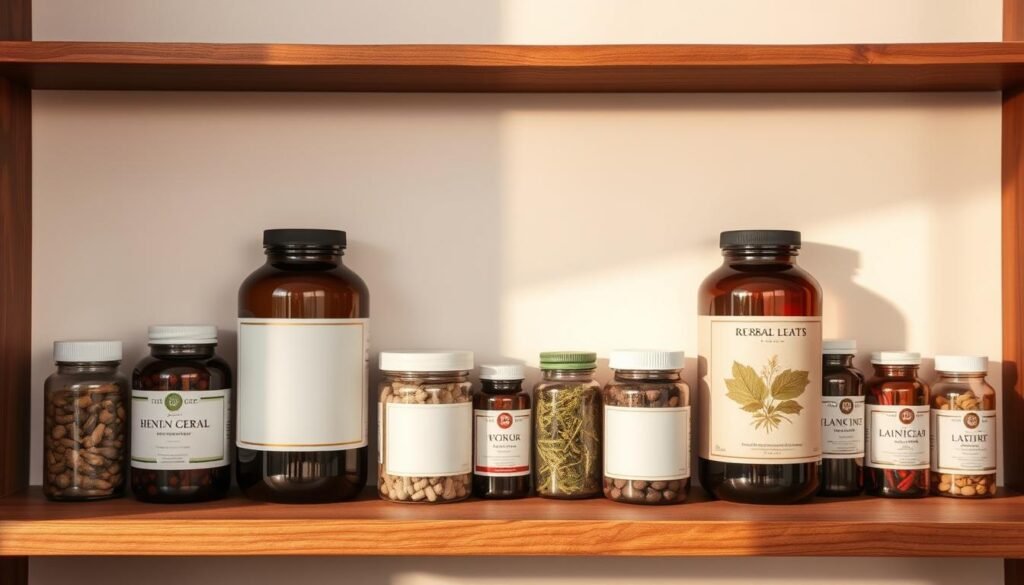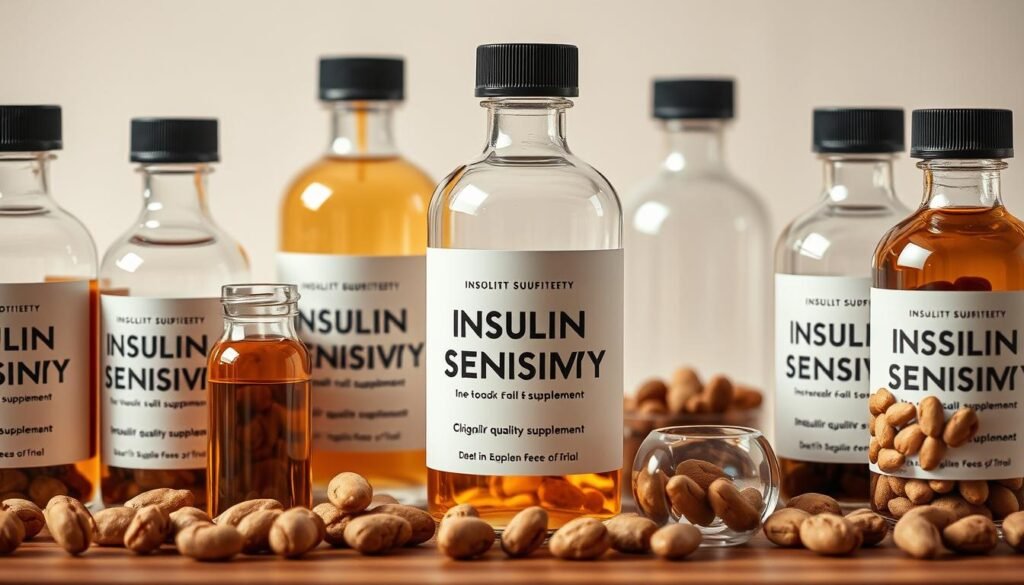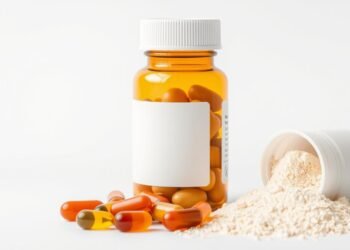Diabetes affects 463 million people worldwide, and this number is expected to grow. Most of these cases are type 2 diabetes. Keeping insulin sensitivity normal is key. This has led to a lot of interest in insulin sensitivity supplements.
In the U.S., over a quarter of adults with diabetes use supplements. A 2020 study found 51% of diabetics worldwide use supplements. The big question is: do these supplements really help with type 2 diabetes?
This section will explore the growing interest in supplements for type 2 diabetes. We’ll look at what insulin sensitivity is and why it’s important. We’ll also examine the claims about different supplements. By the end, you’ll know if these supplements can really help with insulin sensitivity.
Key Takeaways
- Diabetes affected 463 million people globally in 2019, with figures expected to rise substantially.
- 90% of diabetes cases are type 2 diabetes, where insulin sensitivity plays a critical role.
- More than a quarter of U.S. adults with diabetes used complementary medicine in 2012.
- A 2020 meta-analysis found 51% of diabetics globally use some form of complementary medicine.
- This review aims to assess whether insulin sensitivity supplements work and their overall effectiveness.
Understanding Insulin Sensitivity
Insulin sensitivity helps control blood sugar levels. It shows how well cells use insulin, a key hormone. This is important for energy and storing glucose.
Boosting insulin sensitivity fights metabolic disorders like type 2 diabetes.
What Is Insulin Sensitivity?
Insulin sensitivity is how well cells take in glucose with insulin. When cells are good at this, blood sugar stays normal. This prevents big changes in blood sugar that can harm health.
Less insulin sensitivity means high blood sugar. This is called insulin resistance. It often leads to type 2 diabetes. So, making cells more sensitive to insulin is key to avoiding diabetes.
Why It Matters for Health
Good insulin sensitivity is key for health. It helps manage glucose and keeps metabolism working well. But, insulin resistance can cause serious problems like diabetes, heart disease, and obesity.
High blood sugar can damage nerves, kidneys, and eyes. Improving insulin sensitivity with natural remedies and supplements can greatly improve health.
Lifestyle changes like diet, exercise, and managing stress are important. Supplements like magnesium, probiotics, and inositol also help. For example, magnesium lowers diabetes risk by improving insulin sensitivity. Probiotics also help lower blood sugar in people with diabetes.
The Role of Insulin in the Body
Insulin is key to understanding insulin resistance and diabetes. It’s made by the pancreas and helps cells use glucose. This is how insulin keeps blood sugar levels right.
How Insulin Affects Metabolism
Insulin helps cells take in glucose, lowering blood sugar. When we eat, our blood sugar goes up. This makes the pancreas release insulin.
Even though pancreatic islets are small, they work hard. They get a lot of blood to help them work well. This is important for our body’s health.
In healthy people, insulin helps cells use glucose better. This is true even when blood sugar is high. Hormones like glucagon-like peptide-1 also help insulin work better.
Insulin’s job is to help cells use glucose. It does this by starting important signals in the cell. These signals help the cell take in glucose.
Insulin Resistance Explained
Insulin resistance happens when cells don’t respond to insulin well. This means we need more insulin to keep blood sugar normal. About one in three adults in rich countries have this problem.
This issue is linked to being overweight. It’s also tied to living in cities and eating too much. These changes have made more people overweight.
When we have too much insulin, it can lead to diabetes. Most people with type 2 diabetes are overweight. This shows how being overweight affects our health.
Most people with metabolic syndrome have insulin resistance. This makes heart problems more common. It’s a big health issue.
| Aspect | Fact |
|---|---|
| Insulin Composition | 51 amino acids |
| Pancreatic Islets | 1-2% of pancreas volume, 10% of blood supply |
| Initial Insulin Secretion | Glucose concentration >5 mM |
| Diabetes and Obesity Correlation | Over 75% with type 2 diabetes are obese or overweight |
| Prevalence of Insulin Resistance | 1 in 3 adults in developed countries |
| Metabolic Syndrome | 80% exhibit insulin resistance features |
Common Insulin Sensitivity Supplements
Looking into the best supplements for insulin sensitivity means knowing what’s out there. We’ll look at popular choices and how they might help.
Overview of Popular Options
Many supplements are talked about for improving insulin sensitivity. Here are some:
- Magnesium: This mineral helps control glucose. Not having enough magnesium can lead to insulin resistance.
- Chromium: Chromium helps with carbs and fats. It’s thought to make insulin work better in the body.
- Omega-3 Fatty Acids: In fish oil, omega-3s fight inflammation. They might also lower insulin resistance.
- Apple Cider Vinegar: Some studies say it boosts insulin sensitivity. It helps the body use insulin better.
- Bitter Melon: This fruit is thought to lower blood sugar. It helps cells take in more glucose.

How They Claim to Work
Each supplement has its own way of helping with insulin sensitivity. Here’s how they claim to do it:
- Magnesium: It helps with insulin and glucose by working in enzymes.
- Chromium: Chromium is said to make insulin signals stronger. This helps cells take in more glucose.
- Omega-3 Fatty Acids: Omega-3s might reduce inflammation. They also help insulin receptors work better.
- Apple Cider Vinegar: It’s believed to slow down how fast food leaves the stomach. This helps keep blood sugar levels stable.
- Bitter Melon: Some studies suggest it can stop glucose from being absorbed. It also affects liver enzymes. But, more research is needed.
Each insulin resistance supplement works in its own way. Knowing which one is right for you is important. Always talk to a doctor before starting any supplements.
Evidence Behind Insulin Sensitivity Supplements
Diabetes is a big problem worldwide, with 463 million people affected in 2019. This number is expected to grow to 700 million by 2045. Supplements that help with insulin resistance are getting a lot of attention. This section looks at the latest insulin sensitivity research.
What Does Current Research Say?
People with diabetes are looking for ways to improve their health. A 2020 study found that 51% of adults with diabetes use supplements. In the US, over 26% of adults with diabetes use them too.
Different supplements have been tested to see if they help with blood sugar levels. Insulin sensitivity research shows that chromium, Vitamin C, and omega-3 fatty acids might help a little. Probiotics also seem to have a positive effect. Vitamin D might help too, but more research is needed.
Key Studies to Consider
When looking at supplements for insulin resistance, it’s important to know which ones work. Here are some key studies on supplements and their effects:
| Supplement | Effect on HbA1c | Effect on FBG |
|---|---|---|
| Chromium | −0.54% | Superior to placebo |
| Vitamin C | −0.54% | Superior to placebo |
| Omega-3 PUFAs | −0.27% | N/A |
| Probiotics | −0.43% | Superior to placebo |
| Vitamin D | −0.17% (trials | Superior to placebo |
| Magnesium | N/A | Superior to placebo |
| Zinc | N/A | Superior to placebo |
| Polyphenols | N/A | Superior to placebo |
Studies show that not enough sleep can make insulin resistance worse. Getting enough sleep can help. Also, exercising regularly can make insulin sensitivity better over time.
Research on insulin sensitivity is ongoing. It looks at how supplements can help manage diabetes. Both clinical and observational studies offer insights. This shows the need for a personalized approach to using supplements.
Natural Ways to Improve Insulin Sensitivity
Making natural changes can greatly help your health. We’ll look at how diet and exercise can improve insulin sensitivity without supplements.
Diet Changes That Help
What we eat affects our insulin sensitivity a lot. Here are some diet tips:
- Eating less carbs can help, mainly for adults at risk of type 2 diabetes.
- Switching to polyunsaturated fats over carbs and saturated fats helps control blood sugar.
- More soluble fiber slows down digestion and lowers blood sugar after meals, helping insulin work better.
Some people find intermittent fasting helpful. It can lower insulin resistance in overweight and obese adults. Foods and supplements with probiotics and omega-3s also help control blood sugar. Getting enough sleep is key, as bad sleep can make insulin resistance worse.
Exercise and Its Impact
Exercise is key for better insulin sensitivity. It’s a big help in managing insulin levels:
- 30 minutes of activity, 3–5 days a week, can improve insulin sensitivity right away. Doing it long-term makes it even better.
- Resistance training works well for improving insulin sensitivity, even for those with diabetes.
- losing weight, and belly fat in particular, makes insulin work better and lowers diabetes risk.
For those with type 2 diabetes or mobility issues, focus on moderate aerobic exercise and resistance training. Even low-intensity activities can help if done regularly.
Here’s a quick summary of diet and exercise’s impact on insulin sensitivity. It shows the best exercise types and how often to do them based on health:
| Health Condition | Exercise Type | Frequency |
|---|---|---|
| Without Diabetes | High-intensity aerobic & strength training | 30 minutes, 5 times/week |
| With Type 2 Diabetes | Moderate-intensity aerobic & high-repetition resistance training | 30 minutes, 5 times/week |
| With Limited Mobility | Low-intensity aerobic & resistance activities | 3 times/week |
Making these diet and exercise changes can greatly improve insulin sensitivity naturally. These lifestyle changes lower diabetes risk and promote healthier habits for the long term.
The Benefits of Improving Insulin Sensitivity
Improving insulin sensitivity is good for your health. It helps manage weight and lowers the risk of chronic diseases. The benefits are many and important.
Potential Health Rewards
One big benefit is better blood sugar control. People who are healthy and active see big improvements. Losing 10 to 20 pounds can make a big difference.
Imagine losing 10 to 20 pounds. You’ll feel better and your body will work better too.
Long-Term Effects on Well-being
Improved insulin sensitivity has long-term benefits. Exercise and a healthy diet help keep insulin working well. Aim for 30 minutes of activity most days and do muscle-strengthening exercises too.
Walking after meals helps control blood sugar. This means you might need less insulin. It’s good for your health.
Lowering the risk of Type 2 diabetes is a big plus. Insulin resistance is common in those with Type 2. But, medicines like metformin help manage it.
By making healthy lifestyle choices, you can lose weight better. This approach improves your overall health. It reduces the risk of chronic diseases and helps you live longer.
Choosing the Right Insulin Sensitivity Supplement
When picking supplements for better insulin sensitivity, knowing what matters is key. Quality ingredients and understanding the right factors can help a lot. Choosing wisely can lead to better insulin management.

Factors to Consider
There are important things to think about when picking insulin sensitivity supplements:
- Clinical Evidence: Make sure the supplement works thanks to science.
- Reputable Brands: Pick brands known for good quality and clear labels.
- Proper Dosage: Use the right amount based on studies and doctor advice.
- Types of Insulin: Think about how different insulins, like regular and rapid-acting, affect you. The “1500 rule” for regular and “1800 rule” for rapid-acting insulin can help figure out your sensitivity.
Importance of Quality Ingredients
The ingredients in insulin sensitivity supplements really matter:
“Good ingredients mean better health benefits and less risk.”
When picking insulin sensitivity supplements, look for:
- Ingredient Purity: Go for supplements with pure, natural ingredients and no bad stuff.
- Transparency: Trust brands that tell you where and how their ingredients are made.
Looking closely at supplements can help you make better choices:
| Supplement | Effectiveness | Common Dosage | Notable Benefits |
|---|---|---|---|
| Cinnamon | Reduces fasting blood sugar by up to 19.26 mg/dL | 1-6 grams daily | Improves insulin sensitivity |
| Nigella Sativa | Significantly reduces fasting blood sugar | 1-3 grams daily | Improves glucose homeostasis |
| Magnesium | Improves fasting blood glucose, HDL, LDL, triglycerides | 200-400 mg daily | Supports overall metabolic health |
| Vitamin D | Modestly reduces HbA1c | 600-2000 IU daily | Lower risk of developing type 2 diabetes |
Choosing supplements with quality and proven ingredients can really help your insulin sensitivity and health. Making smart choices means you get the best supplements for you.
Potential Risks and Side Effects
Insulin sensitivity supplements might help, but they can also have side effects. It’s important to know about these risks. This way, you can take steps to stay safe.
Understanding Possible Reactions
Many people take supplements to help with diabetes. But, different supplements can cause different problems. For example, α-Lipoic acid might make your stomach hurt, give you headaches, or cause skin rashes. It’s best to watch your blood sugar and health closely when starting a new supplement.
Other supplements have risks too. Bitter melon can upset your stomach, and Chromium might be bad for your kidneys or liver. Always be careful and know the risks before using them.
How to Minimize Risks
To stay safe, start with small doses. This lets your body get used to it slowly. Also, always talk to your doctor before taking any supplements. A study showed many patients weren’t asked about their supplements by doctors.
Keep an eye on your blood sugar and health. Some supplements can interact with medicines or make side effects worse. Make sure to choose supplements made safely.
Here’s a quick look at some common supplements and their side effects:
| Supplement | Common Doses | Potential Side Effects |
|---|---|---|
| α-Lipoic Acid | 300–1,800 mg daily | Gastrointestinal upset, headache, skin rash |
| Berberine | 0.9–1.5 g daily | Antiplatelet effects, drug interactions |
| Bitter Melon | 2–4 g daily | Gastrointestinal complaints |
| Chromium | 200–1,000 µg daily | Risks for kidney or liver issues |
| Cinnamon | 120–6,000 mg daily | Unsafe at higher doses, special caution with warfarin |
By being careful and informed, you can enjoy the benefits of supplements safely.
Expert Opinions on Insulin Sensitivity Supplements
Getting advice on insulin supplements can really help. We’ve gathered insights from nutritionists and doctors who know a lot about health. They share their thoughts on what works best for insulin sensitivity.
What Nutritionists Recommend
Nutritionists say a balanced diet is key. They also suggest supplements to help with insulin sensitivity. For example, folic acid can help control blood sugar, according to studies.
Myo-inositol is good for women with PCOS. It helps lower insulin resistance. NUTRIOSE, a type of fiber, also helps by reducing insulin resistance in overweight people.
Probiotics are another favorite. They can lower insulin resistance by 20% in women with gestational diabetes. Nutritionists think they’re very helpful.
Insights from Medical Professionals
Doctors also have their favorites for improving insulin sensitivity. Resveratrol is one, as it helps obese people better. Alpha-lipoic acid and chromium are also recommended for their benefits in glucose metabolism and diabetes risk.
Probiotics are also in the spotlight. They help type 2 diabetes patients a lot. Doctors also talk about vitamins K and D, staying hydrated, and minerals for better insulin sensitivity.
Here’s a table with some expert advice and medical findings on insulin sensitivity supplements:
| Supplement | Recommendation | Medical Insights |
|---|---|---|
| Folic Acid | Improves glycemic control | Potential role in diabetes management |
| Myo-Inositol | Reduces insulin resistance in PCOS | Effectiveness in PCOS patients |
| Probiotics | 20% reduction in insulin resistance in GDM patients | Significant influence on insulin sensitivity in type 2 diabetes |
| Resveratrol | Improves insulin sensitivity in obese populations | Targets metabolic dysfunction |
| Alpha-Lipoic Acid | Enhances glucose metabolism | Improves insulin sensitivity in diabetics |
| Chromium | Improves metabolic health | Essential for reducing diabetes risk |
| Vitamin K | Lowers risk of type 2 diabetes | Improves insulin sensitivity |
In short, experts agree on the benefits of certain supplements for insulin sensitivity. But, always get advice from a healthcare provider for the best results.
Personal Success Stories
Real-life stories about supplements show how they help. People talk about better insulin sensitivity and managing blood sugar. These stories show how supplements can change lives.
Real-Life Testimonials
Many people share how supplements helped them. For example, alpha-lipoic acid helps with glucose uptake. This leads to better blood sugar control.
“Alpha-lipoic acid changed my life,” said one user. “My blood sugar levels went down, and I have more energy all day.”
Chromium picolinate also gets good reviews. It helps with insulin action and glucose metabolism. A user said, “Chromium picolinate kept my blood sugar stable and cut down my cravings.”
This supplement helps those with insulin resistance a lot.
“Berberine has been a game-changer for me. It helped regulate my blood sugar and, more importantly, improved my overall insulin sensitivity. Incorporating it into my daily routine has made managing my condition much easier.” – A Berberine User
Supplements work by fixing problems with insulin resistance. For example, berberine boosts AMPK. This helps with glucose and lipid metabolism.
“Berberine lowered my fasting blood sugar,” said a user. “I feel more in control of my condition.”
Lessons Learned from Users
Users share both good and bad experiences with supplements. They say being consistent and watching dosage is key. Taking berberine in smaller doses throughout the day works best.
They also say supplements work better with healthy living. Eating well and exercising are important.
For instance, magnesium is vital for insulin sensitivity. Omega-3 fatty acids from fish oil and flaxseed oil help with blood sugar by reducing inflammation.
Key Takeaways from User Experiences:
- Consistency in supplement use is essential for seeing results.
- Combining supplements with healthy lifestyle changes maximizes benefits.
- Monitoring dosage and splitting it throughout the day can enhance efficacy.
These stories show how people manage insulin sensitivity. They highlight the role of supplements in health.
| Supplement | Reported Benefits | Dosage Recommendations |
|---|---|---|
| Alpha-lipoic acid | Improved glucose uptake, better blood sugar management | 600-1,200 mg/day |
| Chromium picolinate | Enhanced insulin action, stable blood sugar levels | 200-1,000 mcg/day |
| Berberine | Lowered blood sugar, improved insulin sensitivity | 500-1,500 mg/day, divided doses |
| Magnesium | Boosted insulin sensitivity | 400-420 mg/day |
| Omega-3 fatty acids | Reduced inflammation, better blood sugar regulation | 1,000-2,000 mg/day |
The Future of Insulin Sensitivity Research
Research on insulin sensitivity is growing fast. It helps us understand why it’s so important. Almost 40% of U.S. adults have insulin resistance.
This is why studying insulin sensitivity is key. It helps prevent diseases like type 2 diabetes and heart disease.
Emerging Trends in Supplements
Natural compounds and probiotics are becoming popular for improving insulin sensitivity. Studies show they can change the gut microbiota. This includes Lactobacillus and Lachnospiraceae NK4A136 group.
An 8-week study found that E. coli Nissle 1917 can help with liver fat and hormone levels in mice. This opens up new ways to make supplements that help with insulin sensitivity.
The Ongoing Need for Studies
Even with promising trends, more studies are needed. A review found 4985 articles on insulin sensitivity. But only 169 were good enough to study closely.
Studies like metreleptin (NCT00085982) are checking how it helps with blood sugar in people with genetic insulin problems. This shows we need to keep researching how supplements and treatments work over time.
| Statistic | Data |
|---|---|
| Global prevalence of Type 2 Diabetes Mellitus (T2DM) | Nearly 90% of all diabetes cases |
| Potential literature articles reviewed (Feb 2021 – Mar 2022) | 4985 |
| Clinical trial registry outputs found | 339 |
| Mice genera enriched after specific supplement | Lactobacillus, Lachnospiraceae, Ruminococcus |
| Ongoing clinical trials registries assessed | 10 |
We need better treatments for diabetes, which is a big problem today. Finding new ways to help with insulin sensitivity is very important. It’s not just for now, but for the future too.
Conclusion: Should You Try Insulin Sensitivity Supplements?
As we finish talking about insulin sensitivity supplements, it’s important to choose wisely. We’ve looked at how these supplements work, the science behind them, and their possible dangers. Let’s summarize what we found to help you decide.
Recap of Key Points
Insulin sensitivity is key for keeping blood sugar levels healthy. Supplements like Berberine, Gymnema Sylvestre, Alpha Lipoic Acid, and Vitamin C can help. Berberine is special because it lowers fasting blood sugar and helps insulin work better.
Other supplements, like ginger and Gymnema Sylvestre, also have benefits. But, their effects can differ in studies. Gymnema Sylvestre helps with glucose and insulin, while probiotics have mixed results. It’s important to look at each supplement’s safety and how well it works.
Final Thoughts for Consideration
With so many options and different levels of science backing them, it’s key to weigh the benefits. Always talk to a doctor before trying new supplements, if you have health issues or take medicine. Supplements like cinnamon and Vitamin D are good for people with prediabetes and PCOS, showing they can help based on your health.
By looking at the science and your own health, you can make a smart choice. While some supplements might help with insulin sensitivity, remember to eat well and exercise too. The main thing is to find what works best for you, with the help of a doctor.










